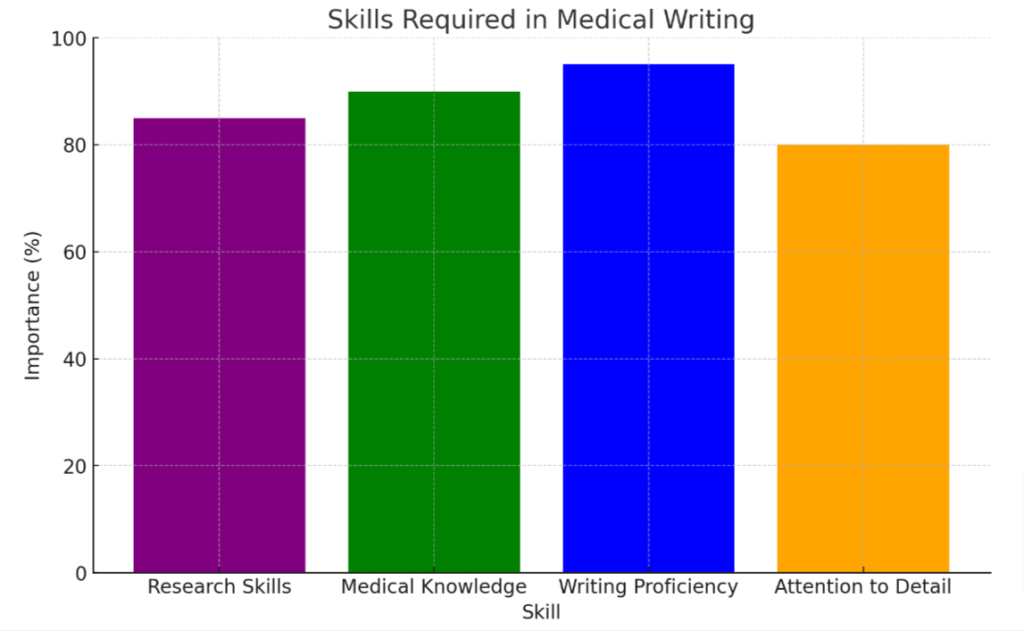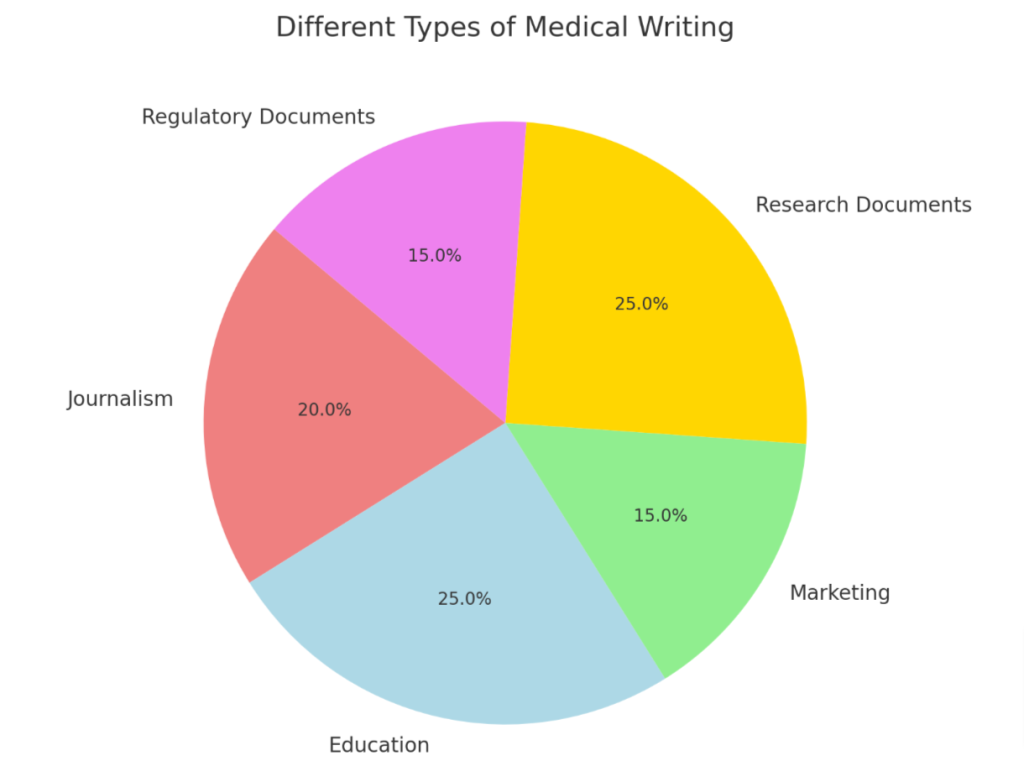The Essentials of Writing in the Health Sector
Navigating the world of health writing can feel like deciphering a foreign language. Did you know it spans beyond medical journals into areas such as health education, marketing, and regulatory documents? This blog is your handy guide to demystify this expansive field and chart your course towards becoming a competent health writer.
Intrigued? Read on and let’s begin this exciting journey together!
Key Takeaways
- Health writing encompasses various types, such as medical journalism, medical education, medical marketing, publication and presentation, research documents, and regulatory documents.
- To become a successful medical writer, you need domain knowledge in medicine or healthcare, general writing skills like grammar and research skills for gathering accurate information.
- Professional development and networking are crucial for staying updated with trends and best practices in health writing. Utilize resources like books, style guides, educational programs, and professional associations to enhance your skills.
Types of Medical Writing
Medical writing can be categorized into various types, including medical journalism, medical education, medical marketing, publication and presentation, research documents, and regulatory documents.
Medical Journalism
Medical journalism bridges the gap between health professionals and the general public. It focuses on creating informative pieces about medical discoveries, healthcare policies, and wellness topics for news outlets such as newspapers, television broadcasts, magazines, and online platforms.
A medical journalist works to translate complex medical terminology and concepts into language that is easily understandable by a layperson. They often interview health experts or patients for their stories to ensure accuracy while keeping readers engaged.
Their work plays a crucial role in enhancing public understanding of important health issues and advancements.
Medical Education
Medical Education writing focuses on creating instructional materials for healthcare professionals and students. It involves the development of textbooks, online courses, training modules, patient education handouts, and other educational resources.
As a medical writer in this field, you need an understanding of various scientific topics and teaching methodologies.
Creating content for medical education demands a high level of accuracy because it’s used for training future doctors or nurses. You don’t just write about diseases or treatments; you also need to explain complex concepts clearly so learners can easily understand them.
Writing skills are crucial here; however, one should also master the art of making complicated ideas accessible without diluting scientific integrity.
Medical Marketing
Medical marketing plays a pivotal role in connecting healthcare professionals with the services and products they need. A vital aspect of health communication, it involves creating compelling content to promote pharmaceuticals, medical devices, or other health-related services.
Medical marketers use multiple platforms ranging from digital channels, such as websites and social media, to traditional methods like print ads and broadcasting through television or radio.
Understanding the target audience is key to devising effective medical marketing strategies that comply with regulatory guidelines yet resonate with consumers or healthcare providers.
Publication and Presentation
Medical writers play a crucial role in the publication and presentation of research findings. They are responsible for translating complex medical information into clear and concise language that can be understood by both healthcare professionals and the general public.
Whether it’s writing scientific articles, conference abstracts, or patient education materials, medical writers ensure that the information is accurate, well-organized, and accessible.
By effectively communicating research findings through various channels, they contribute to advancing medical knowledge and improving healthcare outcomes.
Research Documents
Medical research documents are an essential part of the healthcare field, providing crucial information for scientific advancements and treatment options. These documents include research papers, clinical trial reports, and case studies that present findings and data in a clear and concise manner.
Medical writers play a vital role in producing these documents by effectively communicating complex scientific concepts to various audiences, including healthcare professionals and regulatory bodies.
Through thorough research, meticulous data interpretation, and precise writing skills, medical writers contribute to the dissemination of knowledge within the medical community.
Regulatory Documents
Regulatory documents play a crucial role in the field of medical writing. These documents are essential for obtaining regulatory approval for drugs, devices, and procedures. They include protocols, investigator brochures, clinical study reports, and regulatory submission dossiers.
The purpose of these documents is to provide comprehensive information on the safety and efficacy of the product or intervention being studied. Medical writers who specialize in regulatory writing must have a strong understanding of research methodologies, data analysis, and scientific communication.
Their role is to ensure that these documents are clear, accurate, and compliant with applicable guidelines and regulations.
In addition to writing skills, regulatory medical writers need to stay updated on changing regulatory requirements and industry standards. They collaborate closely with researchers, statisticians, clinicians, and other stakeholders to gather relevant information for their documents.
Requirements and Skills for Becoming a Medical Writer
To become a medical writer, you need to have domain knowledge, general knowledge and skills, an understanding of writing processes, focus on professional development, and the ability to network effectively.

Domain knowledge
Domain knowledge is a crucial requirement for becoming a successful medical writer. It refers to having in-depth understanding and expertise in a specific field, such as medicine, healthcare, or pharmaceuticals.
This knowledge allows writers to effectively communicate complex information in a clear and concise manner. Whether it’s medical literature, research papers, or educational materials, domain knowledge enables writers to accurately convey scientific concepts and terminology to both professionals and the general public.
By possessing this expertise, medical writers can create content that is credible, accurate, and informative for their target audience.
General Knowledge and Skills
To become a successful medical writer, you need to have a solid foundation of general knowledge and skills. This includes being proficient in grammar, spelling, and punctuation to ensure clear and concise writing.
Additionally, strong research skills are essential for gathering accurate information from credible sources. Critical thinking skills are also important for analyzing data and drawing meaningful conclusions.
Effective communication skills are crucial for conveying complex medical concepts in an accessible manner. Lastly, attention to detail is vital for ensuring accuracy and precision in your work as a medical writer.
Writing Processes
Medical writing involves various processes that contribute to the production of clear and accurate healthcare content. One important aspect is research, where medical writers conduct literature reviews, data analysis, and interpretation.
They also collaborate with experts to collect information and ensure its accuracy. Another crucial process is writing itself. Medical writers create engaging and informative articles, reports, and documents using concise language tailored to specific audiences.
Editing plays a significant role as well, ensuring that the final content meets high standards of grammar, style, and clarity. Collaboration with healthcare professionals throughout these processes helps to provide accurate information for readers in the medical field.
Professional Development
Developing and honing your professional skills is crucial for success as a medical writer. Professional development allows you to stay up-to-date with the latest trends, research, and best practices in the field.
It also provides opportunities for networking and building connections with other professionals in the industry. By attending conferences, workshops, and webinars related to medical writing, you can enhance your knowledge base and gain valuable insights from experts.
Additionally, seeking certification or advanced training programs can help demonstrate your expertise and increase your credibility as a health writer. Stay proactive in pursuing professional development opportunities to continuously grow as a medical writer.
Networking
Networking is a crucial aspect of becoming a successful medical writer. By connecting with others in the industry, you can gain valuable insights, share knowledge, and even find job opportunities.
Attend conferences and workshops related to medical writing to meet professionals and build relationships. Join online communities or professional associations where you can engage in discussions and learn from experienced writers.
Actively seek out mentoring or coaching opportunities to further enhance your skills and expand your network. Remember that networking is not just about finding work; it’s about building meaningful connections that can support your career growth in health writing.
Resources for Medical Writers
Medical writers can benefit from a variety of resources, including books and style guides, educational programs, professional associations, tools for writing and research, and guidelines on publication ethics.
Books and Style Guides
To become a successful health writer, it is important to have access to reliable resources and references. Here are some books and style guides that can help you enhance your medical writing skills:
- “Publication Manual of the American Psychological Association (APA)”: This guide provides detailed instructions on formatting, citation, and referencing in APA style, which is commonly used in medical literature.
- “The Chicago Manual of Style”: Widely used by writers from various disciplines, this manual offers guidelines on grammar, punctuation, and writing style. It also covers footnotes and bibliographies.
- “AMA Manual of Style: A Guide for Authors and Editors“: Specifically designed for medical writers, this manual focuses on the unique requirements of scientific writing in the field of medicine.
- “The Elements of Style” by William Strunk Jr. and E.B. White: This classic guide offers concise rules on grammar, composition, and clarity in writing.
- “Writing Science: How to Write Papers That Get Cited and Proposals That Get Funded” by Joshua Schimel: Geared towards scientific writing, this book provides valuable insights into effectively communicating research findings.
- “Medical Writing: A Prescription for Clarity” by Neville W. Goodman et al.: A comprehensive guide to medical writing that covers different genres like research papers, abstracts, case reports, and more.
- “Style: Lessons in Clarity and Grace” by Joseph M. Williams: This book emphasizes the importance of clear and concise writing while offering practical tips for improving sentence structure and organization.
Publication Ethics
Publication ethics is a crucial aspect of medical writing. It involves ensuring the integrity, honesty, and transparency of research findings before they are published. This includes adhering to ethical guidelines such as obtaining informed consent from study participants, disclosing conflicts of interest, avoiding plagiarism or data manipulation, and respecting patient confidentiality.
Following publication ethics not only maintains the credibility of the research but also protects the rights and well-being of individuals involved in the studies.
Professional Associations
Professional associations play a crucial role in the field of medical writing. These organizations provide valuable resources and support to their members, helping them stay up-to-date with industry trends, guidelines, and best practices.
They offer opportunities for networking, allowing medical writers to connect with peers, mentors, and potential employers. Professional associations also organize conferences, workshops, and webinars that help enhance skills and knowledge in different areas of medical writing.
By joining these associations, medical writers can access job boards or platforms where they can find freelance or full-time writing opportunities. Being part of a professional association not only adds credibility to a medical writer’s profile but also provides a sense of belonging to a community that shares the same passion for health communication.
Educational Programs
Educational programs are essential for aspiring medical writers to gain the necessary skills and knowledge for their career. These programs provide formal training and education in medical writing, ensuring that writers are equipped with the right tools to excel. Here are some educational programs that can help kickstart a career as a health writer:
- Certificate Programs: Many universities and professional organizations offer certificate programs specifically tailored for medical writing. These programs cover various aspects of medical communication, such as scientific writing, literature review, and regulatory document preparation.
- Master’s Degree in Medical Writing: Pursuing a master’s degree in medical writing is another option for individuals looking to specialize in health communication. These programs provide an in-depth understanding of medical research methods, data interpretation, and effective communication strategies.
- Online Courses: There are several online platforms that offer specialized courses in medical writing. These courses provide flexible learning options and cover topics like health journalism, editing skills, and grant proposal writing.
- Workshops and Conferences: Attending workshops and conferences related to medical writing allows aspiring writers to learn from industry experts, network with professionals, and stay updated on the latest trends in the field.
- Continuing Education Programs: As technology advances and new research emerges, it is crucial for medical writers to stay up-to-date with the latest developments. Participating in continuing education programs helps writers refine their skills, learn about emerging technologies, and remain competitive in the industry.
Tools for Writing and Research
Medical writers have access to a variety of tools that can aid them in their writing and research. These tools help ensure accuracy, efficiency, and organization in the creation of medical content. Here are some essential tools for medical writers:
- Reference Management Software: Tools like EndNote, Mendeley, and Zotero assist in organizing references and citations, making it easier to keep track of sources and generate bibliographies.
- Grammar and Plagiarism Checkers: Programs such as Grammarly and Turnitin can identify grammar errors, spelling mistakes, and potential instances of plagiarism, helping to maintain high-quality writing.
- Data Analysis Software: Statistical software like SPSS or SAS is used to analyze data collected during medical research studies. These programs facilitate data interpretation and support the creation of accurate research reports.
- Medical Databases: Resources like PubMed, Embase, and Cochrane Library provide access to scientific literature and clinical trial databases which are crucial for conducting thorough literature reviews.
- Collaboration Tools: Online platforms such as Google Docs or Microsoft Teams enable seamless collaboration with other researchers, editors, or subject matter experts by allowing real-time document editing and easy file sharing.
- Writing Templates: Using templates specific to different types of medical writing (e.g., journal articles, clinical case reports) ensures adherence to the required structure and formatting guidelines.
- Digital Publishing Platforms: Electronic publishing platforms like Adobe Acrobat or ePub allow medical writers to create interactive documents or eBooks that can be easily shared electronically with healthcare professionals or patients.
- Reference Books: Essential resources like medical dictionaries or style guides (e.g., AMA Manual of Style) provide guidance on terminology usage and proper writing conventions in the field of medicine.
Steps to Becoming a Health Writer
To become a health writer, you need to determine your preferred job type, earn a bachelor’s degree, gain experience and build a portfolio, improve writing skills through courses and workshops, and utilize resources for networking and finding paid work.

Determine preferred job type
Deciding on the type of job you want in health writing is an important first step. Whether you’re interested in medical journalism, education, marketing, publication and presentation, research documents, or regulatory documents, it’s essential to know what area resonates with you the most.
By determining your preferred job type early on, you can focus your efforts and tailor your skills and experiences towards that specific niche within the field of health writing.
Earn a bachelor’s degree
To become a successful health writer, earning a bachelor’s degree is an important step. This degree provides the foundation for developing strong writing skills and gaining knowledge in healthcare topics.
During your studies, you will learn about scientific research methods, medical terminology, and effective communication techniques. Additionally, a bachelor’s degree can help you stand out to potential employers and demonstrate your commitment to the field of health writing.
By completing this educational requirement, you’ll be well-equipped to pursue a fulfilling career as a health writer.
Gain experience and build a portfolio
To become a successful health writer, gaining experience and building a strong portfolio is essential. This allows you to showcase your skills and expertise to potential clients or employers.
Start by seeking out opportunities to write for websites, blogs, or publications in the healthcare field. You can also consider volunteering or interning at medical organizations or hospitals to gain hands-on experience.
As you accumulate more writing samples, be sure to organize them into a professional portfolio that demonstrates your ability to convey complex medical information in an accessible way.
Improve writing skills through courses and workshops
Boost your writing skills by enrolling in courses and workshops specifically designed to enhance your abilities. These programs offer valuable insights into effective writing techniques, grammar rules, and proper formatting.
You’ll learn how to structure your content for maximum clarity and impact, as well as how to engage readers through compelling storytelling. By participating in these learning opportunities, you can refine your craft and become a more confident writer.
Keep developing your skills through ongoing education and practice!
Utilize resources for networking and finding paid work
Utilize various resources to enhance your networking efforts and find paid work opportunities as a health writer. Explore professional associations specific to medical writing, such as the American Medical Writers Association (AMWA), which provides valuable networking events and job boards.
Additionally, consider joining online communities or forums dedicated to health writers where you can connect with fellow professionals and potential clients. Stay updated on industry trends by following reputable websites and blogs related to health writing, as they often share job postings and freelance opportunities.
Finally, leverage social media platforms like LinkedIn to build connections with healthcare organizations, publishers, and other writers in your field. With these resources at your disposal, you can expand your network and uncover rewarding paid work prospects in the world of health writing.
Conclusion
In conclusion, health writing offers a range of opportunities in various fields such as journalism, education, marketing, and research. To become a successful medical writer, one must have domain knowledge, strong writing skills, and the ability to continuously develop professionally.
By utilizing available resources and following the necessary steps, aspiring writers can enter this rewarding career path and contribute to improving health communication for professionals and the general public alike.

